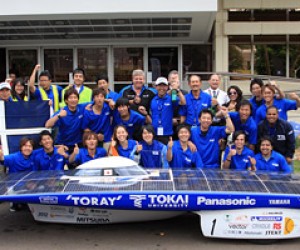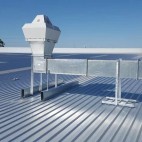Panasonic is committed to the development of sustainable technology for a better tomorrow, which is why they design cutting-edge products that not only consume energy, but that supply energy as well.
One of these sustainable technologies can be found in their high-efficiency HIT™ Solar Modules and Lithium-ion batteries, which are utilised in the Tokai University Solar Team’s car competing in this year’s Sasol Solar Challenge.
The Sasol Solar Challenge – one of the world’s longest courses in solar car racing - has been in existence since 2008 and takes place every two years. The aim of the challenge is to promote sustainable transportation, while leading the way in the development of eco-conscious technology. Panasonic has been supporting the Tokai University Solar Car team since 2011 and the team has won the title in 2008, 2010 and 2012.
Last year the Tokai University Solar Car team competed at the Bridgestone World Solar Challenge where they crossed the finish line in 3rd place. This Australian race, covering a distance of roughly 3000km across the continent from Darwin in the north to Adelaide in the south, saw the participation of 43 university and corporate solar car teams from 25 countries and regions around the world. Some of the Tokai University Solar Car team’s other victories include 1^st place at the Carrera Solar Atacama 2014 in Chile, and 1^st place at the World Solar Challenge in Australia in 2009 and 2011.
The Sasol Solar Challenge, consisting of 14 teams, will start in Pretoria on the 24^th of September, and will finish in Cape Town on the 1^st of October. The 8-day race will be taking teams through Kroonstad, Bloemfontein, Gariep Dam, Graaff-Reinet, Port Elizabeth, Sedgefield and Swellendam along the way. The race occurs on public roads, which means that teams have to comply with normal road rules and conditions, imposed by the road traffic authorities.
The main route is approximately 2000km long, which amounts to around 260km per day. However, teams will have the option to expand their daily distance by driving loops, varying from 23km up to 74km. It is expected that the top teams will reach up to a total of 6000km, covering at least 700km a day on average if it is sunny, at around 90 – 100km/h. The framework of this year’s event will therefore make it possible for teams to set new records in distance, energy consumption and strategic planning. The ultimate winner will be determined by average distance, time, lowest consumption and strategic use of battery power.
With a solar technology partner that has been an industry leader in the business for over 40 years, the Tokai University Solar Car team has everything going for them. The car is equipped with 400 Lithium-ion batteries, 65mm in length and with an 18mm diameter – almost the same as an AA battery. Any energy surplus is stored in the batteries for early morning or evening use.
The Panasonic-trademarked HIT™ solar system is one of the most efficient power generating systems, delivering industry-leading performance. The solar cell of the photovoltaic module HIT™ is an original hetero-junction type, which is composed of mono-crystalline and amorphous silicon layers that prevent recombinations of electrons and thereby minimise power loss. In 2014, Panasonic achieved the world's highest cell conversion efficiency in R&D level (>100cm²), while the Panasonic HIT™ Solar Modules deliver approximately 27% more power than 260W competitor panels, taking installation area into account.
To create hype around the race and its involvement in the development of eco-conscious technology, Panasonic is running a national promotion where followers stand a chance to win their share of R100 000 worth of Panasonic prizes. Fans can enter the competition by sharing their #MoreSunshine pictures on the Panasonic South Africa Facebook page. There are three ways to take their pictures: 1) Go to a participating shopping centre and take a picture of their “sunshine moment” in front of the promotional Panasonic display, 2) spot the Tokai University Solar Team Car on the road and take a picture next to the car, or 3) take a “sunshine selfie” at home.
The Panasonic display will be at the following shopping centres on these dates:
20 – 26 September 2016: Sandton City in Johannesburg
27 Sept – 3 Oct 2016: Gateway Shopping Centre in Umhlanga
27 Sept – 3 Oct 2016: Tyger Valley in Cape Town
27 Sept – 3 Oct 2016: Greenacres Shopping Centre in Port Elizabeth
To find out more about Panasonic’s range of cutting-edge products, as well as their commitment to contribute to a sustainable and environmentally responsible society through clean energy, visit www.panasonic.com










